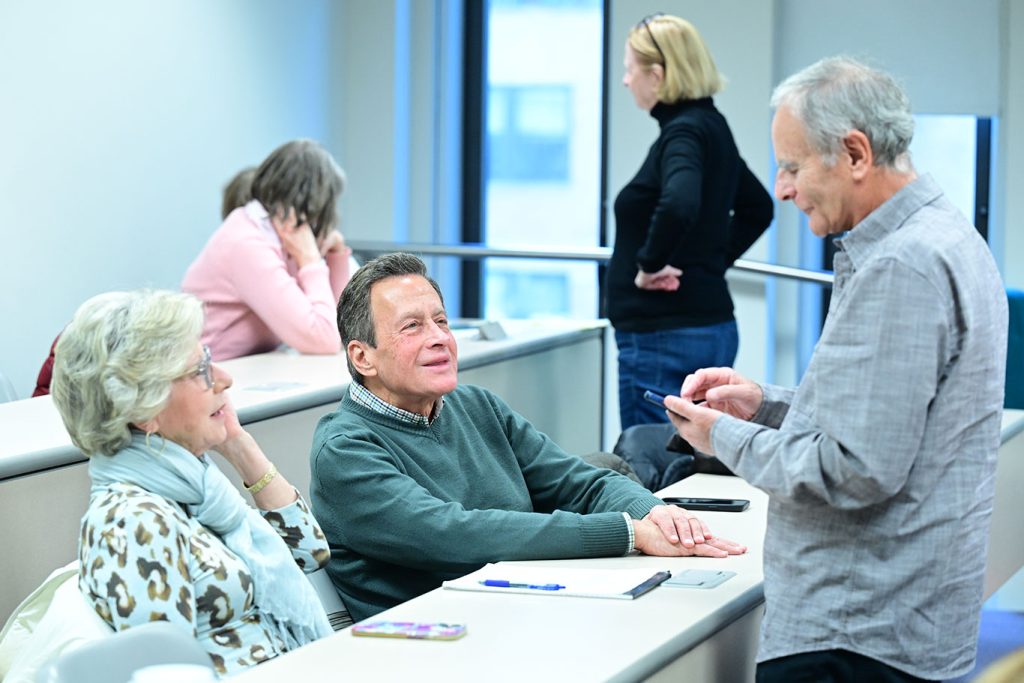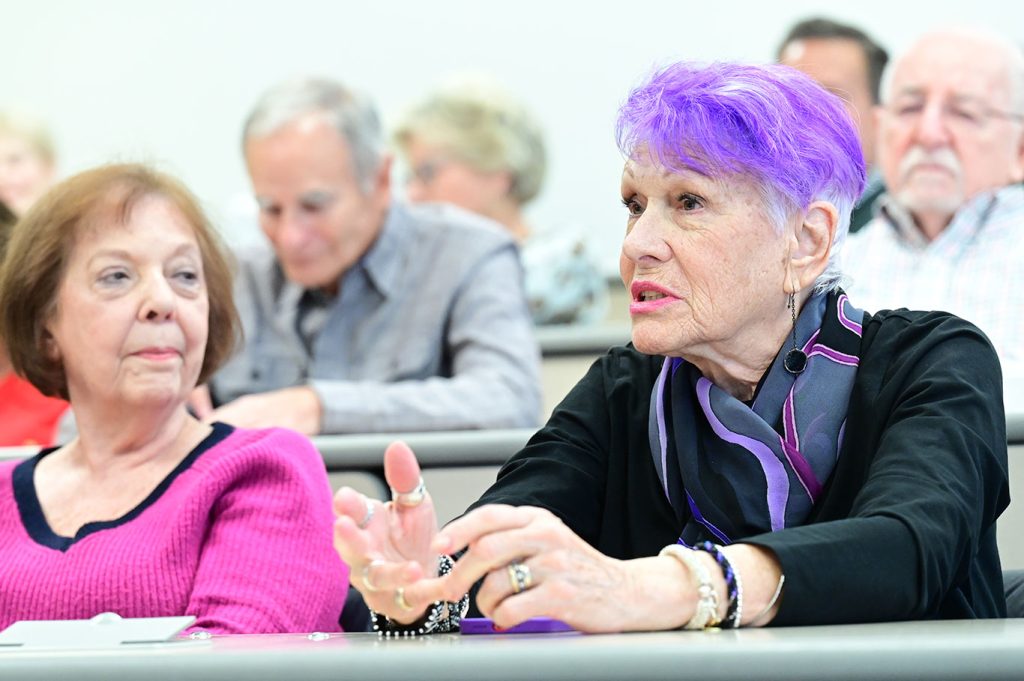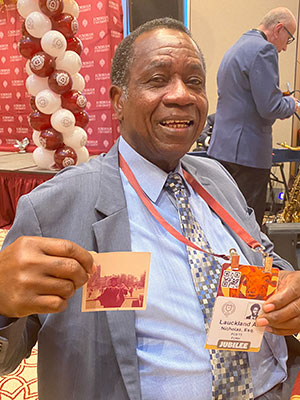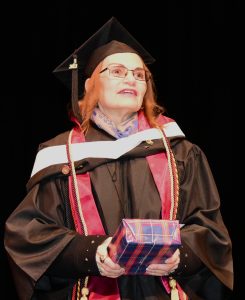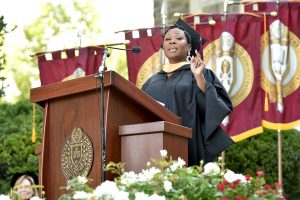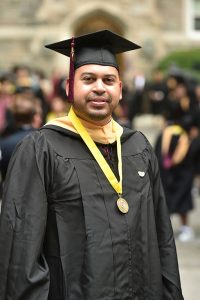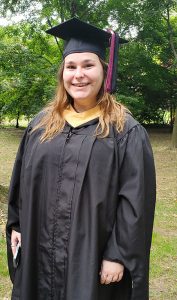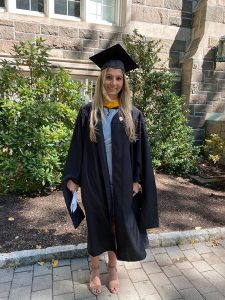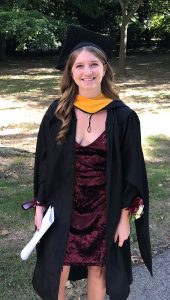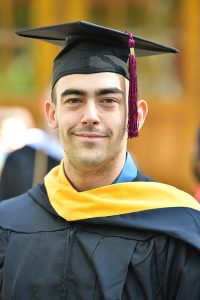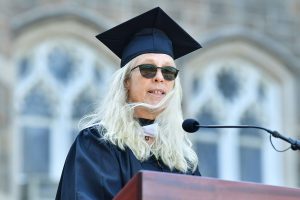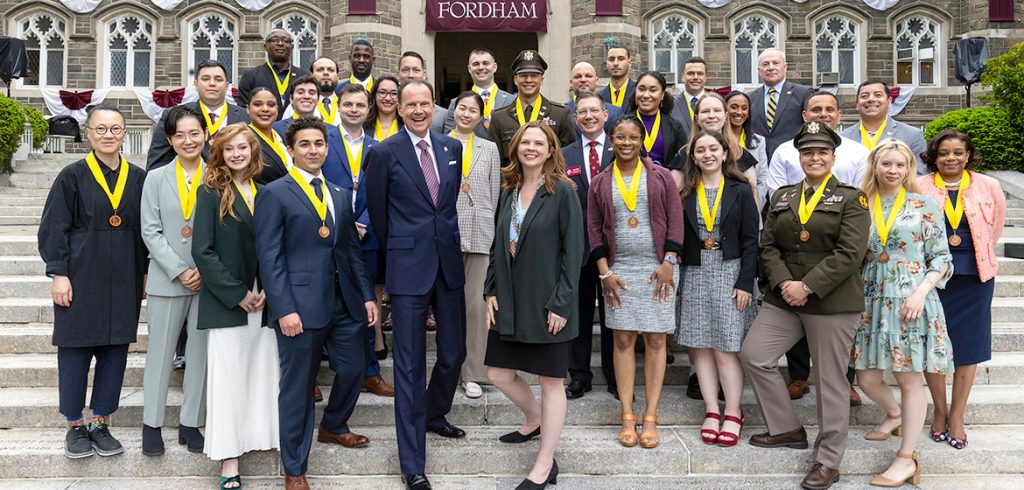
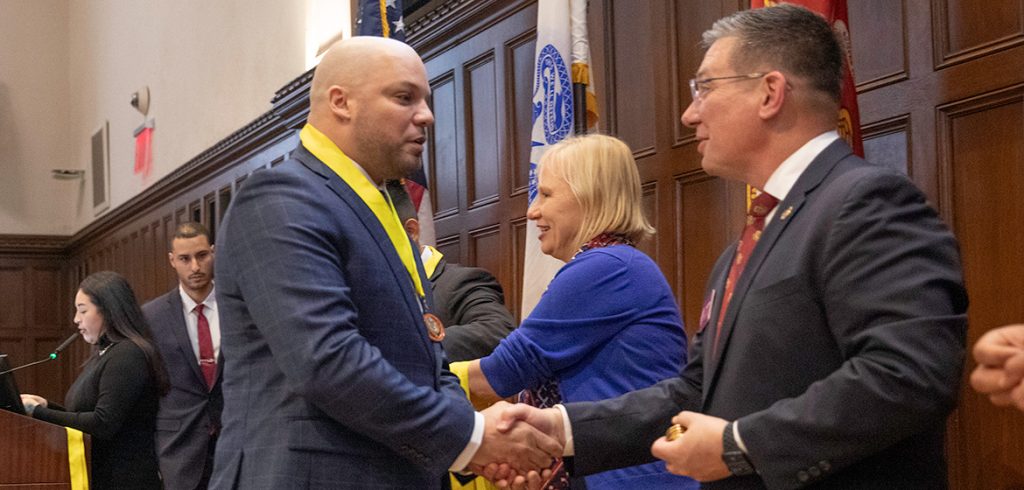
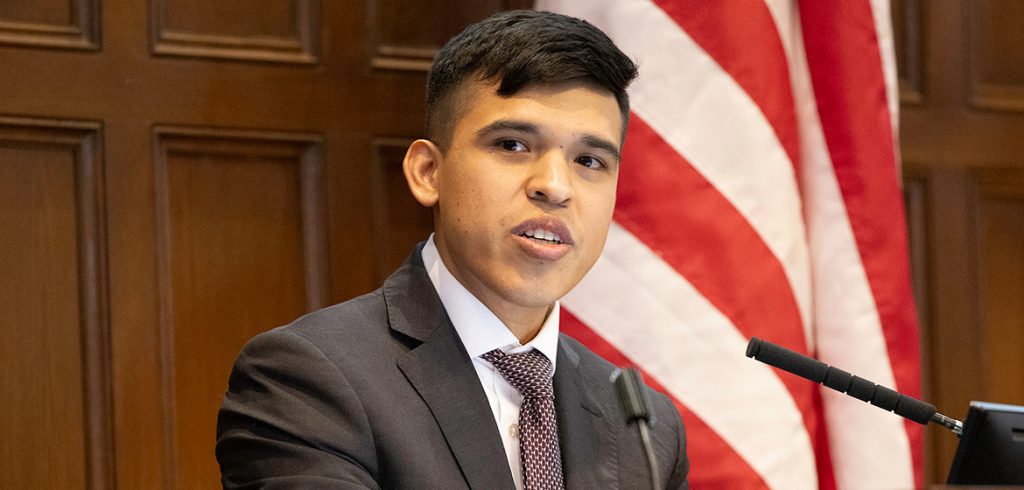
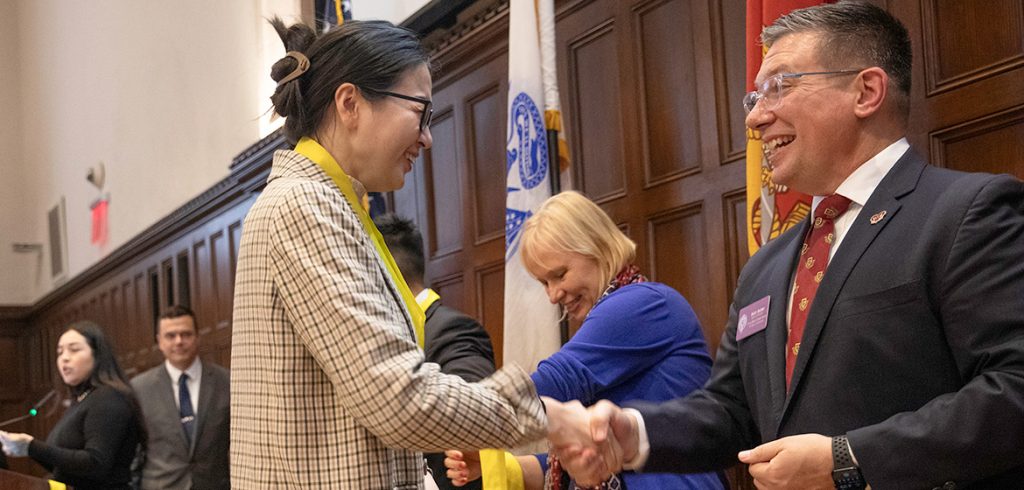
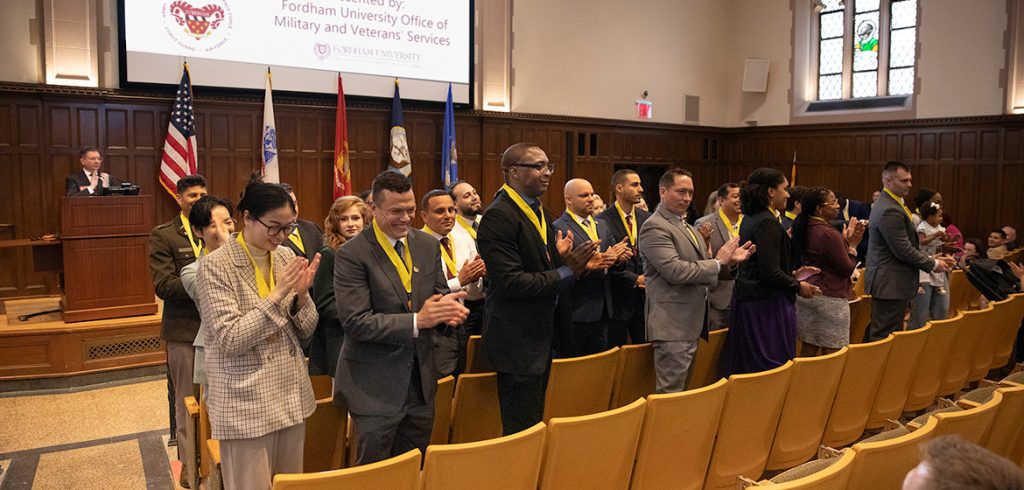
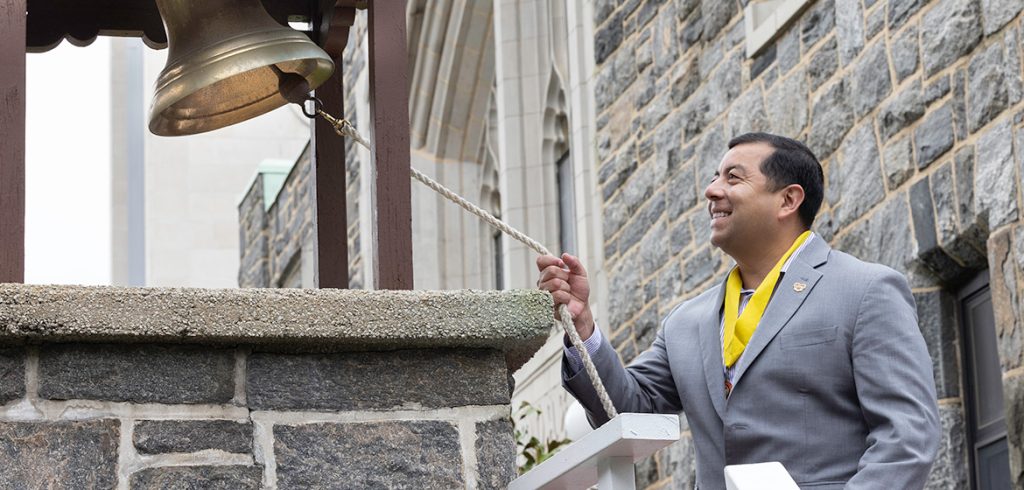
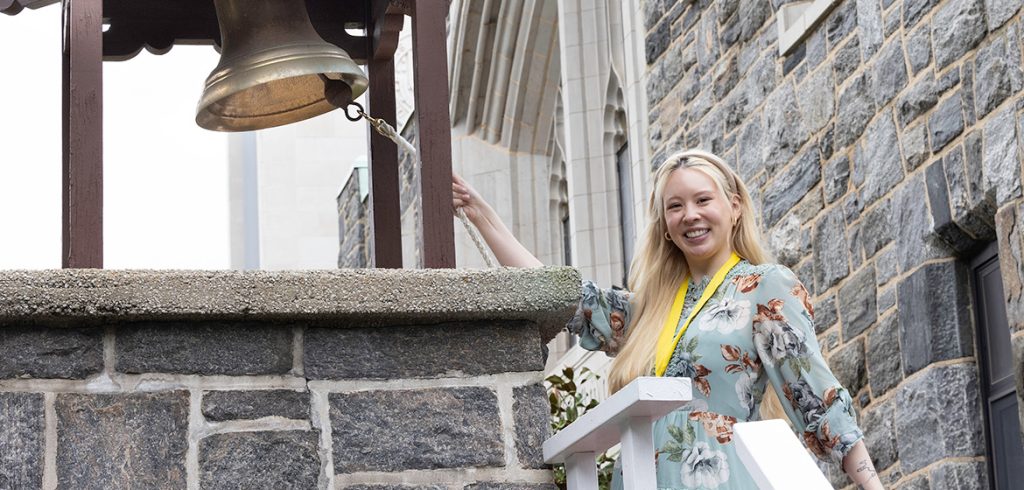
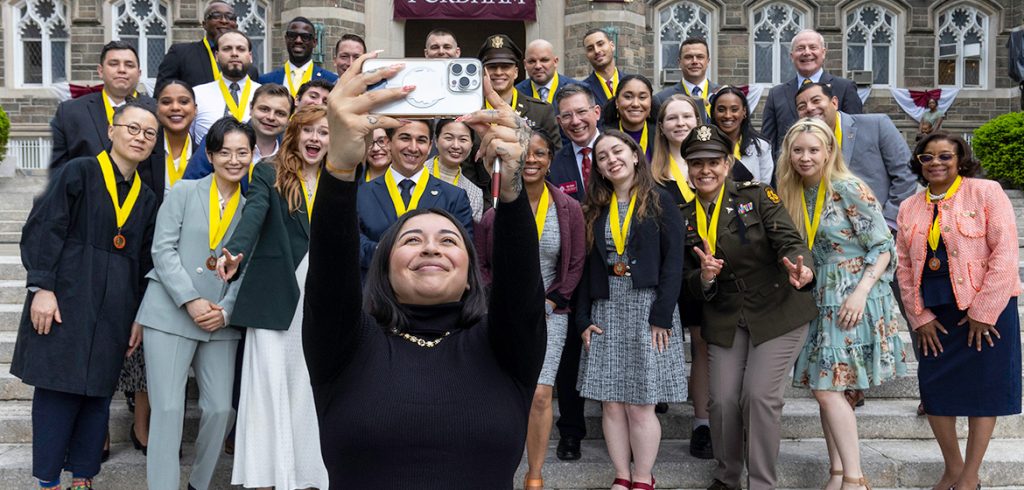
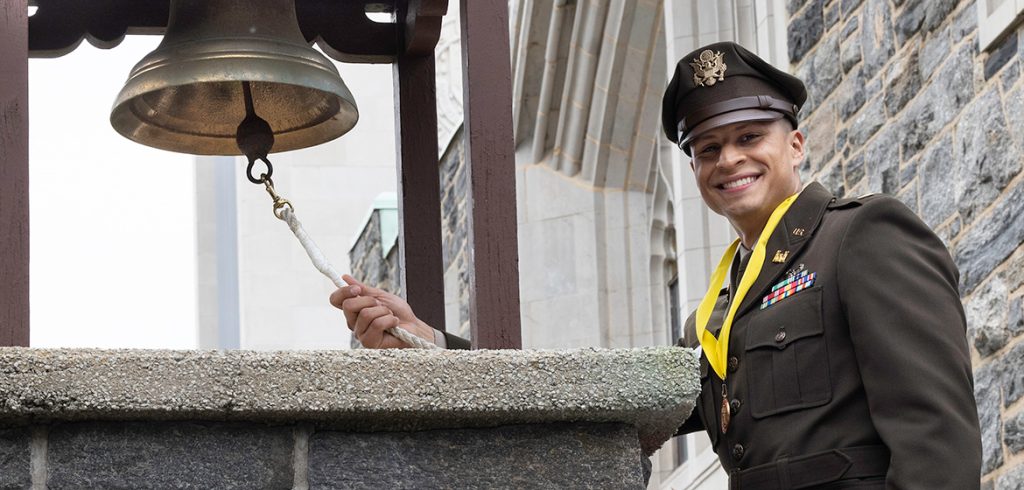
A ceremony on May 17 honored the unique experience of student veterans as well as the character they’ve shown in pursuing their Fordham degrees—which they would earn the following day, at Fordham’s 179th Annual Commencement.
“Think back to when you first made the decision to continue your education. It likely wasn’t an easy choice,” said Robert Molina, PCS ’18, a onetime student veteran and 2023 Harvard Law graduate, at the annual Yellow Ribbon and Bell Ringing Ceremony.
“Many of you juggled the demands of work, family, and studies while navigating the transition to civilian life,” Molina said. “But you persevered. You showed up, day after day, to achieve this goal.”
“The discipline, leadership, and problem-solving skills you developed in the military have served you well,” he said.
At the ceremony, held every year at the Rose Hill campus, 29 graduating student veterans and military-connected students each received a Yellow Ribbon medallion and got a chance to ring the nearby Victory Bell in celebration of their achievement. The honorees included 2nd Lt. Miguel-Angel Sandoval, PCS ’24, a former Army enlisted man who had earned his gold bars at Fordham’s ROTC commissioning ceremony that very morning.
Fordham’s president, Tania Tetlow, and Armando Nuñez, chairman of the University Board of Trustees, also showed up to offer the graduates their congratulations.
‘Something About the Atmosphere Here’
In his remarks, Molina recounted an experience that is common to student vets: serving for years in the military—in his case, for three years in the U.S. Marine Corps—and initially feeling out of place among students in their late teens who had only recently been in high school. “Like St. Thomas Aquinas, we were all adult learners,” he said.
Soon, however, the required philosophy and theology courses piqued his interest in Christianity, and he eventually took advantage of the Order of Christian Initiation for Adults offered by Campus Ministry.
And he absorbed the ethos of Fordham in other ways. “Something about the atmosphere here—the reverence in the campus chapel, the community service rooted in Catholic social teaching—it all spoke to me in a way I couldn’t quite explain,” he said.
He said the student veterans, educated in Fordham’s Jesuit tradition, are prepared to address the current “division, mistrust, and self-interest [that]too often overshadow the common good.”
He remains active with the Student Veterans of America at Fordham and urged the student veterans to help others like themselves.
“Never forget the sacrifices you and your fellow service members have made,” he said, according to prepared remarks. “Use that experience to be a leader in your community, to advocate for causes important to you, and to inspire the next generation of veterans to pursue their education and dreams.”
]]>Both changes, taking effect Aug. 1, ensure that eligible beneficiaries will always have their entire tuition covered at Fordham, as they do now, and will never have to worry about the University running out of seats for them.
The changes “underscore Fordham’s commitment to serving those who serve our country,” said Andrea Marais, Fordham’s director of military and veteran higher education, engagement, and transition.
Eliminating Worry for Veterans
The cap removals are expected to clear up confusion about Fordham’s support for student veterans. For years, the University has covered 100% of tuition and fees for eligible Yellow Ribbon beneficiaries, who also receive a government stipend for books and living expenses.
But service members may never find out about these benefits. Checking out Fordham’s Yellow Ribbon program on the government’s website, they sometimes give up after seeing the caps on tuition coverage and enrollment—even though neither limit has ever been reached.
“Some people may be deterred by the cap, not realizing that our tuition falls below it,” Marais said. “And the posted limit on applicants may sow doubt as well, since there’s no way to know whether the limit has been reached. This announcement eliminates all of that uncertainty.”
Yellow Ribbon Program + G.I. Bill = Full Tuition Coverage
Through the Yellow Ribbon Program, the government partners with private universities to give added funding to veterans who qualify for the full tuition amount ($27,120 per year) offered under the Post-9/11 G.I. Bill.
Fordham’s tuition benefit cap was so high that the University never needed to turn away any eligible veteran—and with the cap gone, it won’t ever need to. That’s good news for service members dealing with financial jitters, said Matthew Butler, PCS ’16, senior director of Fordham’s Office of Military and Veterans Services.
“Veterans aren’t in the position to take any chances” when considering their college costs as they’re transitioning out of the military, he said, also noting that Yellow Ribbon beneficiaries at Fordham receive one of the highest housing allowances in the country.
Michael Condit, a former Army infantryman and recruiter who just completed his bachelor’s degree in economics at Fordham’s School of Professional and Continuing Studies, said veterans may also be looking for a reason to rule themselves out, thinking “oh, I’m not a college person.”
“When you hear that there are caps and restrictions, you might [think], ‘Well, I don’t want to get in line just to be told ‘no,’” he said.
Supportive Community
Assimilating into Fordham after five years of active duty in the Army was “a great experience,” said Miguel Angel-Sandoval, a senior majoring in Real Estate with a minor in economics in the School of Professional and Continuing Studies and a candidate in Fordham’s ROTC program. He’ll be graduating in May with a job already secured at RSM real estate consulting agency.
He was welcomed by members of Fordham’s Student Veterans of America chapter and others who helped erase any feeling of discomfort at being an older student. Coming to Fordham “was the best decision I’ve ever made,” he said.
To learn more about military benefits and opportunities at Fordham, please contact the Fordham Veterans Center at [email protected] or call (212) 636-6433.
]]>Now a civilian, he looks for meaningful patterns in the operations of businesses large and small as a credit analyst for Santander Bank.
Tortora started at Santander as a summer intern when he was an economics student at Fordham’s School of Professional and Continuing Studies. He began his academic journey after success in the armed forces—his service was capped with the conferral of a Navy and Marine Corps Achievement Medal under Combat Conditions in 2019. Today he credits Fordham—and the military community he found there—with setting him on the path to a new kind of success.
When you left the Marines, how did you decide to come to Fordham?
I wanted to go to a good four-year institution and use my non-traditional path as a way to set myself apart. The folks at PCS understood that. I was calling NYU, George Washington University, and a few other D.C. schools and really wasn’t getting a lot of help. Fordham has the name, and it’s in New York, which is not too far from where I grew up in Nutley, New Jersey. One day, I got a call at 5:30 in the morning, California time: it was PCS.
How challenging was it to transition from Marine to student?
The most difficult part is losing that sense of community and purpose when you’re just getting out. It’s hard sitting in the classroom at 25 with much younger students when you have a completely different worldview and experience. Then you pair that with the fact that I haven’t done typical school work since high school.
Having the veterans community at Fordham was really beneficial because you relate to people who’ve been through similar things.
How did your internship in the summer of 2021 with Santander Bank come about?
It all starts with the community that Matt Butler and the Student Veterans of America at Fordham have built. It’s about helping build each other up professionally and academically. So, doing resume workshops right away, doing seminars here and there for interview prep or networking events. I found that there’s a veteran network in finance in New York City. Someone pointed me to an internship, and that was that.
Did you encounter any surprises along the way?
This is going to sound weird, but I’m surprised at how proud I am that I went to Fordham. I went in with the expectations to just finish my degree and start my career, but my experiences there have led me to be extremely proud to have gone to the school.
I know a lot of veterans who are just like, “I show up to class and go home and do my own thing.’ I have friends who were at my wedding whom I met at Fordham.
]]>In 2011, he signed up for a course in Fordham’s College at 60, where he read Ulysses, James Joyce’s epic novel about a day in the life of Leopold Bloom.
“It’s not something I’d sit at home and read by myself, but Brother Ed Kent, who taught it, made it so fascinating,” said Kiehn, a clinical microbiology professor at Memorial Sloan Kettering Cancer Center.
Fordham’s College at 60, which is celebrating its 50th anniversary this year, offers a wide array of classes for lifelong learners like Kiehn. The program’s name refers to both its location on 60th Street and its student body, most of whom are older adults looking to pursue their interests and passions. This fall’s offerings included courses on topics ranging from the psychology of psychopathology and Dante’s Inferno to social security and the Supreme Court.
For Kiehn, the Ulysses class was an opportunity to leave behind pathogenic microorganisms for a study of Joyce’s epic, and he subsequently attended a “Blooms Day” celebration on June 16 at Symphony Space, where Joyce fans gathered to listen to a reading of excerpts of all 18 chapters of the novel.
“It was just fantastic. We went through the whole thing, and it ended at two o’clock in the morning,” he said.
Like Kiehn, Carolyn Titone, FCLC ’79, returned to Fordham for a College at 60 course in 2021 after successful careers in acting and advertising. She and her husband currently co-own Orchard Hill Cider Mill in Middletown.
Her first course was called Reality Has Always Had Too Many Heads: An Introduction to Literary Theory. Reading the course description, she was intrigued by concepts such as trauma theory, queer theory, and post-colonial criticism.
“I thought, ‘I don’t know what half of this stuff is,” she said.
“Instead of taking something in my wheelhouse, I decided to explore things I had never studied.”
This semester, she’s enrolled in two courses: China, Russia, Ukraine, and the World; and Slavery, the Half Has Never Been Told.
“As you get older, it’s really important to challenge yourself. I could take theater courses and have a great time, but to develop a point of view about race theory or something like that, that’s making your brain work,” she said.
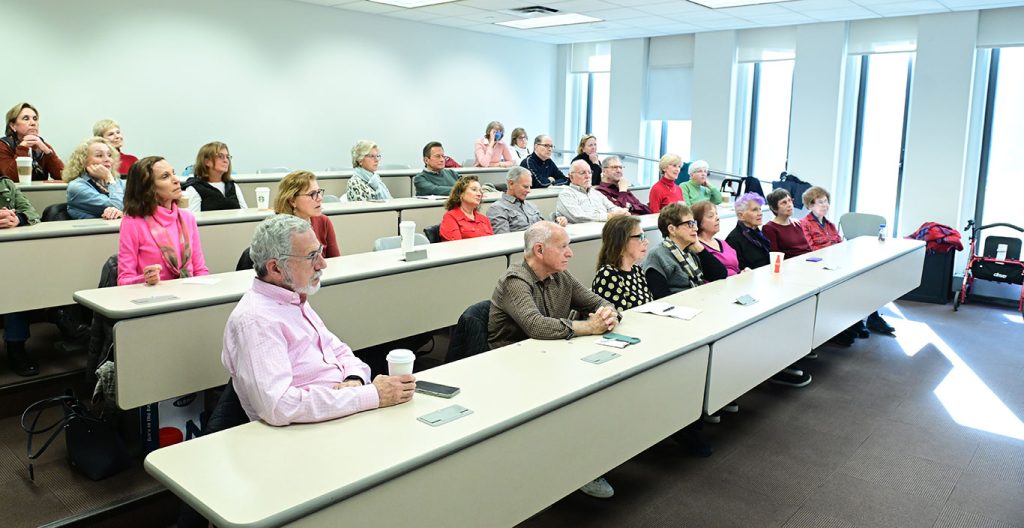
Celebrating 50 Years
Founded in 1973 by former Cambridge University Press editor Robert Adamson, Ph.D., College at 60 was originally geared toward non-traditional students of any age looking to earn an undergraduate degree. It was part of Fordham’s College at Lincoln Center before being moved in 1998 to the College of Liberal Studies (now the School of Professional and Continuing Studies).
The credit-bearing course degree pathway was phased out between 1996 and 1999, and the current model, a non-credit program, replaced it.
George Shea, Ph.D., a dean emeritus of Fordham College at Lincoln Center, taught a class in the program’s first year and came out of retirement in 2011 to teach again. He said the fact that Americans are living longer makes it more necessary than ever.
“We’re getting close to the point where people don’t really start to work until their late 20s, and they often retire in their 50s, and they’re living a long time,” he said. It’s important that Fordham help “keep those people’s minds working.”
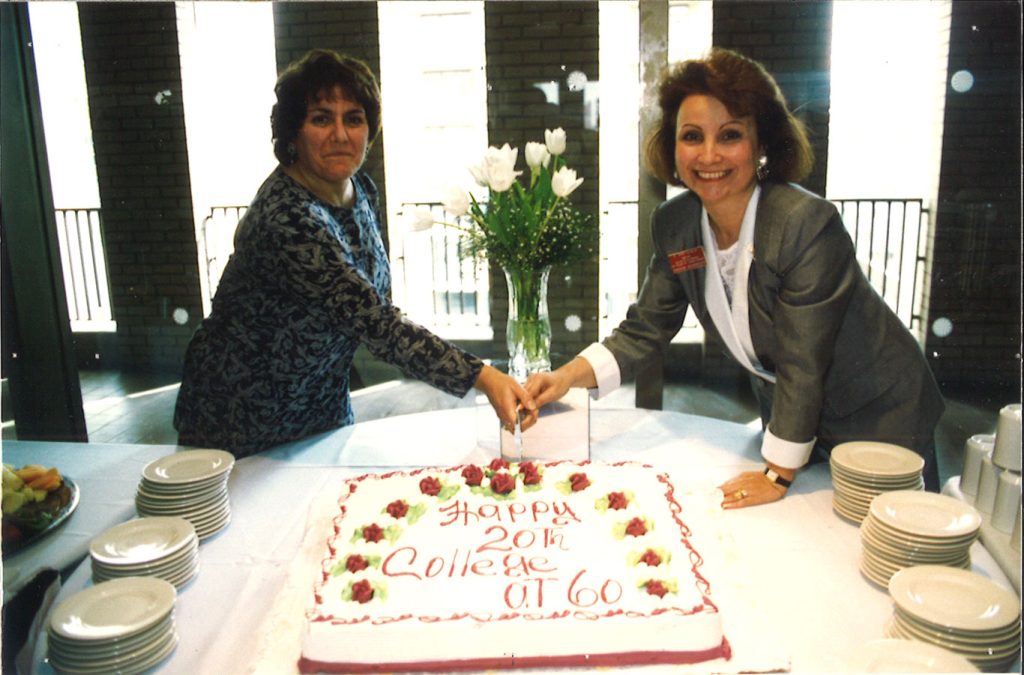
“The students enrolled in the College at 60 embodied the desire to learn and further enrich their long lives,” DeJulio said. “In so doing, they enriched my life in countless ways for which I will always be grateful.”
Staying Vibrant
Cira Vernazza, a former director of College at 60 who was involved with the program for 39 years, promptly signed up for classes herself upon retirement. She credited Adamson with teaching her how to look at older adults differently.
“He showed me how vibrant retirement can be. In 1981, the image that most people had was you either sat in a rocking chair, played golf, took care of the grandchildren, or visited family,” she said.
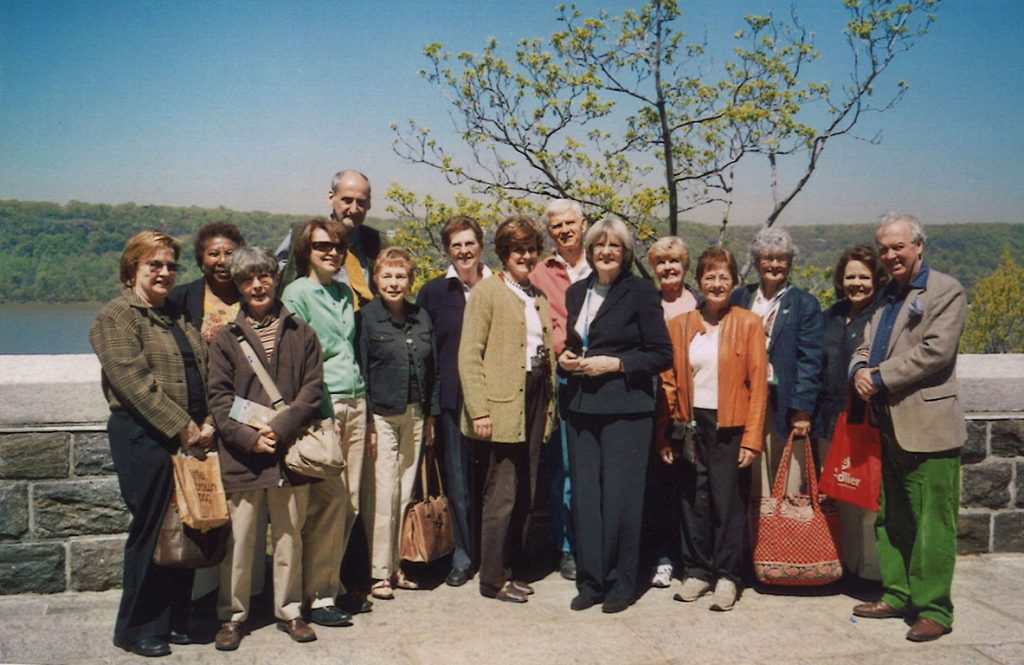
Nicole Bryan, an associate dean for academic programs at Fordham’s School of Professional and Continuing Studies, who took over the program in 2021, noted that the pandemic took a toll on enrollment, but the curriculum that Vernazza and the late Laura Greeney, who was an assistant director nurtured, set the stage for a rebound.
“Cira and I share a belief that aging is a beautiful experience that should be both celebrated and respected, and that is the culture we want to keep alive in College at 60,” she said.
Anthony Davidson, Ph.D., dean of the School of Professional and Continuing Studies (PCS), called the program an integral part of the college.
“PCS is all about providing lifelong learning to anyone and everyone who pursues it,” he said.
“The energy and enthusiasm of these students for courses ranging from Shakespeare to sustainable business practices to the arts is a joy to behold.”
]]>Chelsom has been working with Fordham students in the Applied Health Informatics master’s program to show how to tap open-source software to create cost-effective information systems for hospitals and health care providers.
He visited the Ukrainian cities of Rivne and Kiev in August to meet with government representatives and the local nonprofit group 100% Life. The goal of his trip was to lay the groundwork for the software to be used when the war ends. He’d also traveled there before in 2018 as part of a delegation working on behalf of the World Bank to show how telemedicine could be used in rural areas.
“When I started the program, I realized that the open-source software that we had could be implemented in Ukraine, not just for telemedicine, but for electronic health records, generally,” said Chelsom, director of the master’s program, which is offered through Fordham’s School of Professional and Continuing Studies.
In Rivne, he showed representatives with 100% Life how to build an electronic health record using open standards and open-source software called cityEHR. The software gathers health care data from different sources, converts them into a single format, and allows them to be analyzed and shared. Clinicians can add models of the data they need for patient care or clinical research and then generate the user interfaces required to gather those data during routine clinical practice.
“There are systems in Ukraine that are far better technically than the ones currently being used in the U.S., but the market there is still vulnerable. When the war is over, there is going to be so much money flooding in for reconstruction, including health care and electronic health records, and the eyes will light up for commercial companies from outside the country,” Chelsom said, noting that he didn’t want the struggling country to overpay for products when they could be using the open-source software at a very low cost.
Chelsom, who is based in London, expects to recruit a student from Ukraine into the program so they can return to their homeland and promote the software. The program’s current cohort features several students who will take what they’ve learned to non-profits in Nigeria and Pakistan. And Mishal Ahmed, PCS ‘22, a graduate of the program’s inaugural cohort, is using the software to help children in Benin, Africa.
The Russian invasion of Ukraine in 2022 and the ongoing war have paused any progress on health records, but Chelsom is encouraged by the way that telemedicine has actually been used to great effect at field hospitals near the front lines of the war.
Chelsom is hopeful that future students will continue to spread the knowledge of open-source source software to low-income countries around the world.
“Digital health should be making health care way better than it is now, but what’s frustrating is, it’s often an impediment to better health care rather than an enabler, and it can be prohibitively expensive,” he said.
“My frustration drives me to make open-source software and teach programs like the one at Fordham. There is a better way to do this. It will take a long time, but we can do it.”
]]>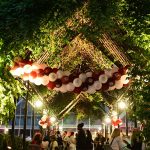

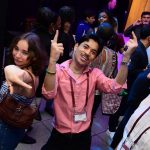

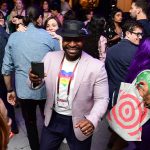
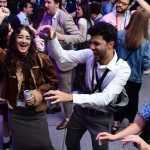
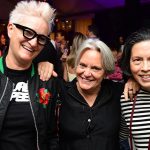
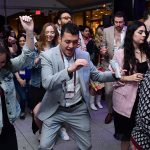
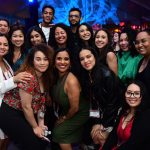
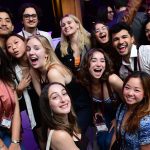
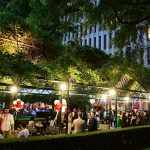

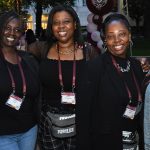
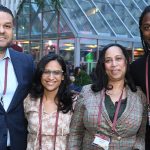
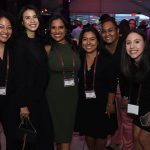
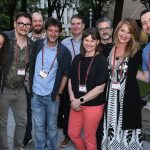
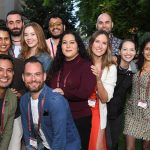
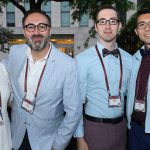
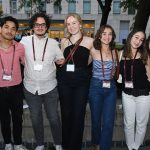
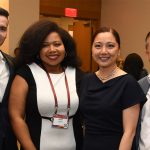
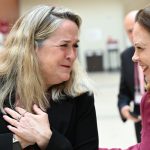
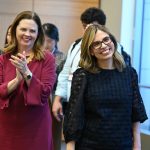
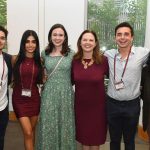
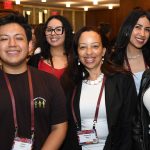
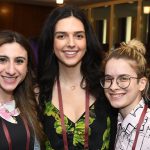
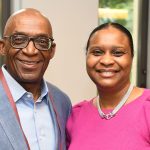

 Just two days after New York City was blanketed in orange haze due to wildfires in Canada, the air cleared, and on June 9, more than 600 Fordham alumni gathered on the Lincoln Center campus for the annual Block Party reunion in the heart of Manhattan.
Just two days after New York City was blanketed in orange haze due to wildfires in Canada, the air cleared, and on June 9, more than 600 Fordham alumni gathered on the Lincoln Center campus for the annual Block Party reunion in the heart of Manhattan.
“It is an astonishing thing that Fordham has this location at the center of everything,” Fordham President Tania Tetlow told attendees. “The epicenter of the global economy, the center of so much media, of arts and culture, of business, of everything you can imagine.”
The alumni who gathered—from Fordham College at Lincoln Center, the Gabelli School of Business, the Graduate School of Education, the Graduate School of Social Service, and the School of Professional and Continuing Studies—spanned generations and spoke of the lasting impact of their time at Fordham.
“This is a place with many happy memories and a place that really changed my life—my husband, my career, my lifelong friends,” said Karen Ninehan, a teacher and former school principal who earned a bachelor’s degree from Fordham College at Lincoln Center in 1974.
When she decided to go into administration, she returned to campus to earn a master’s degree from the Graduate School of Education in 2000. “I knew this was the place where I would get the best of everything,” she said.
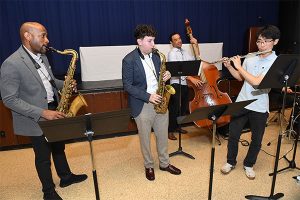
As Ninehan and other guests arrived Friday evening, they had the opportunity to hear some live jazz in Pope Auditorium, thanks to a group made up of two music professors, four students, and Walter Blanding, a tenor saxophonist with the Jazz at Lincoln Center Orchestra. They attended school- and club-specific receptions across campus before coming together on the plaza for food, drinks, and dancing well into the evening.
Reconnecting with Those Who ‘Helped You on Your Journey’
Margot Reid, GABELLI ’21, said she was especially excited for this year’s celebration—in part because as a member of Fordham’s Young Alumni Committee, she had had a hand in planning it.
“It’s something I look forward to—it’s like a big event of the season,” said Reid, who is a marketing associate as ESPN. “It’s nice to see and connect with everybody.”
Matthew Leone, FCLC ’17, another member of the Young Alumni Committee, was attending his first reunion. “I’m coming back just to find some sense of normalcy again and just to rekindle everything,” said Leone, who finished grad school at American University this spring and is working as an immigration paralegal. “I love seeing this different side of Fordham.”
Harleny Vasquez, GSS ’18, a social work career coach and the founding CEO of yourEVOLVEDmind, was among the featured speakers at the Graduate School of Social Service reception, which highlighted the diverse range of careers and opportunities open to MSW graduates.
“GSS did a wonderful job of teaching us our social work foundation,” said Vasquez, who received the GSS Alumni Service Award in recognition of her work with the school’s graduating students. “You hold the power to utilize your social work degree to design the career you desire.”
For Abigail Brown, Julian Goldstein, and Alice Wong, who bonded more than a decade ago in the Gabelli School’s executive MBA program, Block Party was a chance to reconnect and reminisce about their experiences.
Brown, who graduated in 2014 and now works for General Motors as a future retail development manager, said that she not only enjoys networking with fellow alumni but also catching up with faculty and staff.
“It’s really good to see where people are at, and to connect with old deans and faculty members who helped you on your journey,” she said. “It’s inspiring. That’s the word I always leave here with—inspiring.”
Paying Tribute to Influential Faculty and Advisors
At its alumni reception, Fordham College at Lincoln Center honored two retiring faculty members—English professor Anne Hoffman, Ph.D., and economics professor Janis Barry, Ph.D. Members of the Class of 1973 were inducted as Golden Rams, and there were special shout-outs to the Silver Rams of the Class of 1998 and other graduates celebrating milestone reunions.
“It’s really exciting because it brings back a lot of my classmates, and especially since this is our 20th reunion, we have a really good showing,” said Samara Finn Holland, FCLC ’03, a member of the Fordham University Alumni Association Advisory Board. “I think that makes this year stand out above the rest.”
Nearby, more than 20 alumni who worked on The Observer, the award-winning student newspaper at the Lincoln Center campus, gathered to catch up and honor Molly Bedford and Anthony Hazell, FCLC ’06, who stepped down last year as the paper’s visual and editorial advisors, respectively, after seven years.
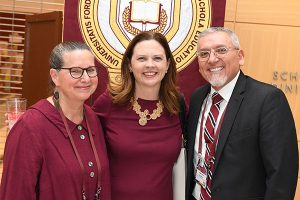
And at the Graduate School of Education reception, retiring professor Margo A. Jackson, Ph.D., received the Dr. Kathryn I. Scanlon Award for her service and commitment to the University since 1999.
‘Fordham Was the Difference in Your Life’
This year marked the first Block Party for Fordham President Tania Tetlow, who spoke at various receptions across campus and also addressed a group of the University’s loyal donors at a cocktail reception in Platt Court.
“I love hearing the stories of how many of you feel like Fordham was the difference in your life,” she said, “the investment and opportunity that gave you the launch to everything that you wanted to do, and helped embed the desire in you to matter to the world.”
—Tanya Hunt, Kelly Prinz, and Connor White contributed to this story.
]]>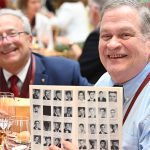
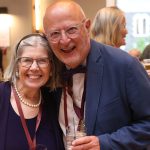
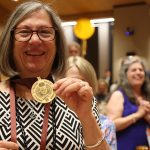
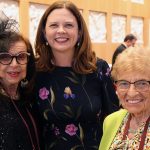
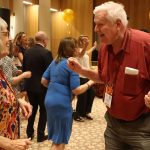
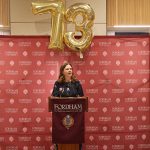
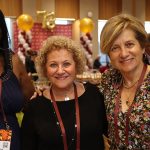
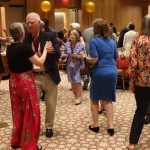
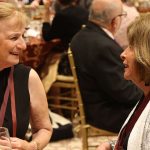
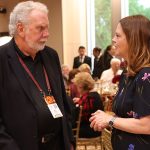
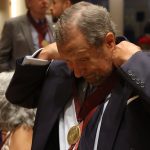
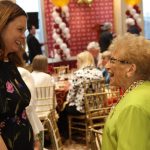
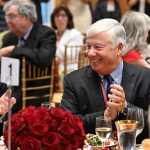 Members of the Class of 1973 traveled from near and far to celebrate their Golden Jubilee at Rose Hill on June 2, exactly 50 years after their Fordham graduation day. For H. Joseph McMaster, FCRH ’73, that meant coming back to the Bronx from Beirut.
Members of the Class of 1973 traveled from near and far to celebrate their Golden Jubilee at Rose Hill on June 2, exactly 50 years after their Fordham graduation day. For H. Joseph McMaster, FCRH ’73, that meant coming back to the Bronx from Beirut.
McMaster, whose maternal ancestors are from Lebanon, said curiosity brought him to the country a few years after he graduated, and he stayed, teaching English at several universities. Living abroad was a huge part of his undergraduate experience at Fordham. With encouragement from George McMahon, S.J., then dean of Fordham College at Rose Hill, he spent his junior year studying in Paris.
“It was very unusual because I was the only one—there were no junior year abroad programs to speak of,” he said, laughing. “Basically it was a do-it-yourself program—you went to France, you registered in a French university, you passed the exams.”
McMaster said that one of the best parts was that he didn’t pay tuition because the French government at the time was covering the cost of higher education for all students enrolled in French universities, and Fordham accepted the credits he earned.
Staying Connected to Fordham
For others, the annual Golden Rams Dinner and Soiree— which honored alumni celebrating 50 or more years since their Fordham graduation and included a cocktail hour and dancing—was just another way to stay connected.
“I never left,” said Stan Pruszynski, FCRH ’73, with a laugh. He was there with his friend Richard Angelico, FCRH ’73, and the two performed a cappella at the dinner with other alumni of the Glee Club (now known as the Ramblers), one of the oldest student groups at Fordham. “The Glee Club has a very strong camaraderie—we have reunions. We have dinners with the Ramblers every year, we go to their concerts, so the connection’s never gone.”

Fordham also helped Rocco Staino, FCRH ’73, and Ann Petelka Picard, TMC ’73, develop a lifelong friendship.
“We’ve kept in contact for 54-odd years,” said Staino, a former editor of The Fordham Ram.
“We met on the open field there,” Picard said, smiling while referring to Edwards Parade. She said she was meeting her friend John, who worked with Staino on the newspaper, when the two were introduced.
Staino joked that he couldn’t believe it was his 50th reunion. “I hosted the 55th anniversary of The Ram [in 1973], and we invited all the alumni back, and I remember how old all those guys were,” he said laughing. “It’s nice to see how the Fordham tradition continues.”
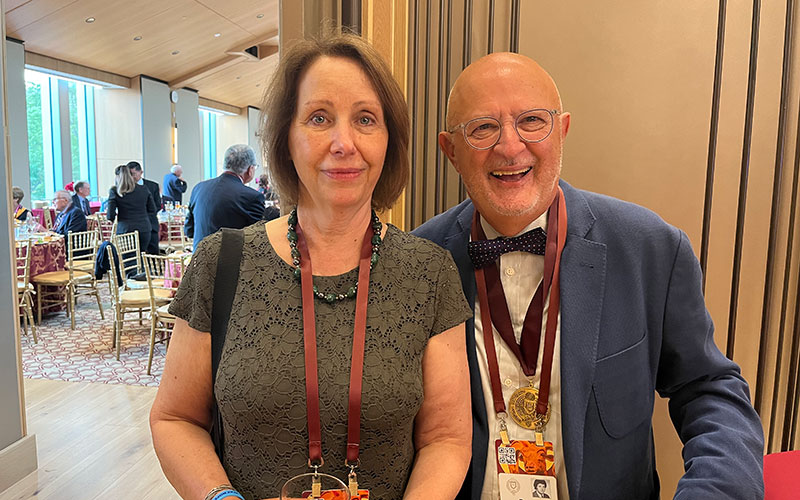
‘Not a Time of Normalcy’
Many of Fordham’s newest Golden Rams noted that the years they spent at the University were some of the most turbulent in the nation’s history. They recalled the protests against the Vietnam War, which nearly resulted in the cancellation of finals in 1970, and described taking part in the first Earth Day celebrations that spring, at the dawn of the modern environmental movement.
“My freshman year, I was coming from a very small town in rural Maryland, so New York City was a big experience for an 18-year-old,” McMaster said. “The year that we came in, ’69–’70, was not a time of normalcy.”
It was also a changing time on campus, as more students of color joined the University, something Lauckland Nicholas, PCS ’73, reflected on while looking at photos he brought from his graduation.
“When I came to Fordham, there were very few Blacks and minorities on campus,” said Nicholas, who is now a lawyer in Washington D.C. But he said that Fordham had a very welcoming community. “I never felt out of place—I was here to receive an education and I did that.”
As she presented the 1973 grads with their Golden Ram medals, Fordham President Tania Tetlow reflected on the “tumultuous, momentous” years in which they studied at the University, a time that included not only the Vietnam War but also the shooting at Kent State and the Watergate hearings. Despite all of the pressures and challenges facing the class, she said, they went on to do remarkable things.
“What you’ve achieved in the last 50 years takes my breath away,” she said to applause. “You broke down doors that were still closed to people like us on Wall Street, in major law firms. Some of you founded nonprofits and reimagined American society, some of you taught fourth graders for 50 years.
“You’ve reminded us of how much Fordham has mattered to your lives … and you’ve expressed your love of this beautiful University and continue to invest in us.”
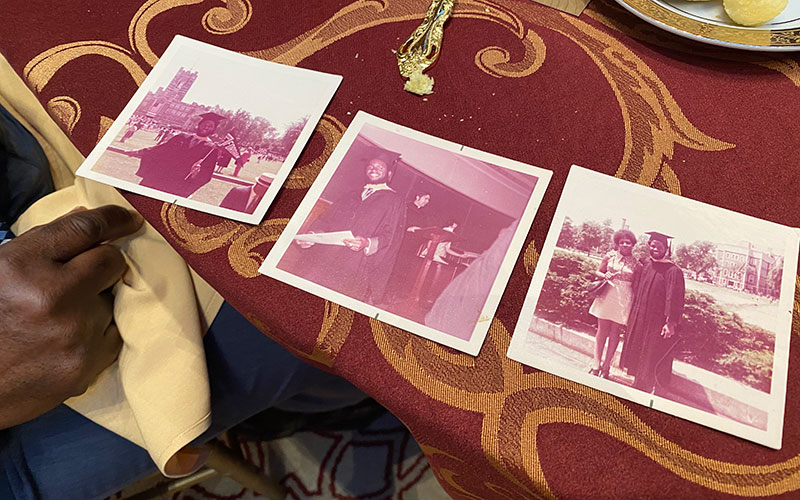
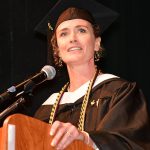
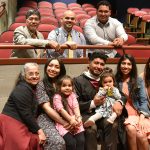
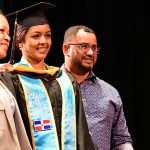
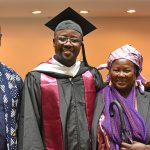
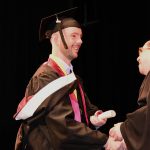
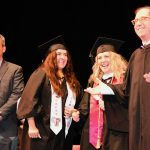 As it does every year, the School of Professional and Continuing Studies diploma ceremony—part of Fordham’s May 20 commencement exercises—celebrated Fordham’s nontraditional students, some of whom were completing educational journeys begun elsewhere, years ago.
As it does every year, the School of Professional and Continuing Studies diploma ceremony—part of Fordham’s May 20 commencement exercises—celebrated Fordham’s nontraditional students, some of whom were completing educational journeys begun elsewhere, years ago.
In an address, one of this year’s graduates, Samantha Ives, spoke about the challenges of going back to school—in her case, resuming her studies after a 20-year gap, during which she raised two children and sought to clarify her direction through various efforts such as volunteering and serving on a nonprofit board.
“I considered going back to school, but three years of actor training 20 years ago wasn’t worth much anywhere I looked—until Fordham,” she said. She brought her 1997 transcripts to one of the school’s information sessions, “and they [oriented] all of who I had been and all of who I was at that moment toward a degree that spoke to who I wanted to become,” said Ives, who earned a bachelor’s degree in organizational leadership.
The school bestowed degrees on 124 graduates at the ceremony, held at Fordham Preparatory School, adjoining Fordham’s Rose Hill campus. They included approximately 25 military veterans and a principal dancer with New York City Ballet, Ashley de Florio, who earned a bachelor’s degree in political science magna cum laude.
The Charles A. O’Neill, S.J., Memorial Award was presented to Angela-Filomena C. LoCascio, who completed the school’s honors program while earning her bachelor’s degree in English. After that, graduates crossed the stage to receive their ceremonial scrolls.
One of them, Carmen Damiani-Hacker, was joined onstage by her daughter, Marissa Hacker, who graduated that day from Fordham College at Rose Hill.
Reading Kant on Lunch Breaks
In her remarks, Ives touched on the experience of returning students and the particular strengths they brought to their schooling. “We took science with classmates who had just finished high school science. We read Kant on our lunch breaks,” she said.
“Many of you coached your own kids through their own transitions to college,” she said. “You changed jobs, you moved once or twice, and you’re still here. We all came here. We didn’t need to find ourselves. We needed to hone the tools we carried. Those tools are battle tested. They are worn, they are strong. We’ve spent the last few years sharpening them up.”
“We’re going to need them,” she said. “We’re going to go apply for that promotion, ask for that raise, start grad school or law school or a brand new profession.”
She acknowledged the graduates’ loved ones who were present, watching online, or present in spirit.
“Every late night, every missed dinner, every Zoom class broke down old walls and made room to grow. But we needed you,” she said. “We need your hearts and your hands, because we’re not done building.”
“Our foundation is strong. Our tools are sharp. We have become architects, and the world we are going to build will be spectacular.”
]]>Jesuit Educated: Caring for the Whole Person
For Fordham College at Rose Hill friends Dylan Hakim and Laura Rose Kelly, Fordham was a transformative experience.
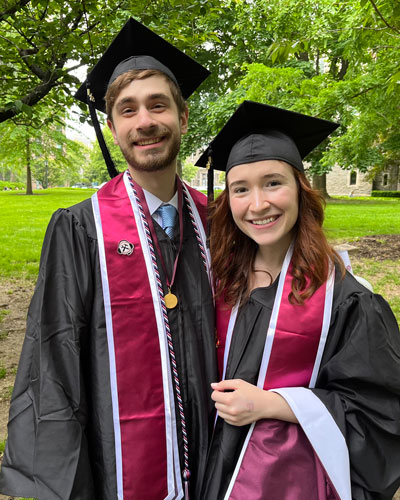
“We have lived so many lives and undergone so much change over the past four years,” said Kelly, a digital technologies and emerging media major and Italian minor from Western Springs, Illinois. “I feel very grateful to be here and to have a normal graduation after so much change and so many moments when we were unsure.”
Hakim, who earned a degree in mathematics with a double minor in philosophy and computer science, said that he feels like he’s become a more well-rounded person.
“People told me when I was going to college, I was gonna learn how to be a person. And I did not believe it because I thought I was already one,” he said.
But Hakim said that the Fordham ideals of cura personalis, or care of the whole person, and eloquentia perfecta, or clear expression for the common good, helped him on his way to becoming “complete.”
Hakim will be teaching math in the Bronx through the NYC Teaching Fellows program, and Kelly will be a marketing coordinator at the Dana-Farber Cancer Institute in Boston.
Enhancing Asian American Culture
Finding a community at Fordham was essential to Fordham College at Rose Hill graduates Maleiya Lorenzo and Arthur Ze An Liu. The two met through their work with multiple Asian clubs and organizations on campus; Lorenzo was vice president of FUPAC (Fordham University Philippine-American Club) and Liu led the Asian Cultural Exchange Club.
“I think for me, the sense of community, and being connected to my culture has been a really big part of college for me,” said Lorenzo, who majored in communications with a concentration in film and TV and a minor in biology. “My favorite club event ever is called Simbang Gabi, which is a Christmas event.”
Liu, who is from Hong Kong, said that he found a second home in New York.
“The culture shock was the toughest part, and that’s a legit phenomenon that people experience,” said Liu, who double majored in economics and political science and double minored in accounting and philosophy. “But what I love about New York City, in particular, is the diversity. And I think that you always find someone of your national origin, if you look hard enough.”
Both said that they appreciated the support of their families along the way.
“I’m happy that we’re finally here, and I get to celebrate with my family. They’re coming from out of state,” said Lorenzo, who is from Charlotte, North Carolina.
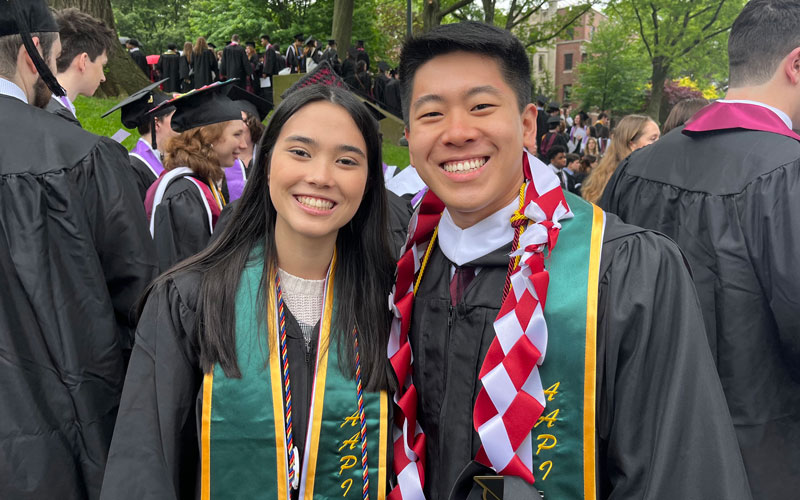
Professional and Continuing Studies: Flexibility and Fun
When the COVID-19 pandemic sent students home to take classes remotely, Alicia Wilcox used that as an opportunity to switch schools for more flexibility.
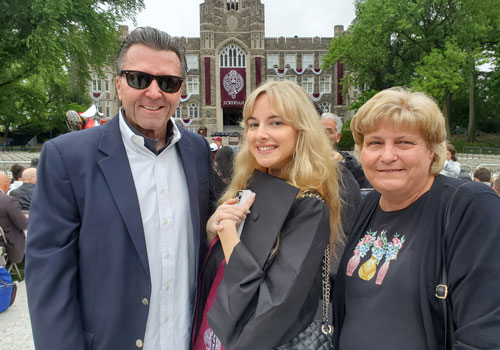
“I always wanted to live in New York, and I started out at [Fordham College at] Lincoln Center, but then I switched to PCS because it was easier with my job,” said Wilcox, who was graduating from the School of Professional and Continuing Studies with a degree in psychology. “I do freelance writing, so I liked PCS because it had night classes.”
Although she took most of her classes at Lincoln Center, Wilcox said some of her favorite memories came from trips to Rose Hill.
“I always love coming to Rose Hill for the games and the events, like Homecoming—that was so fun,” she said.
Finding Friends and Community
Izzy Budetti, who majored in new media and digital design, at Fordham College at Lincoln Center, said she also changed colleges during the pandemic, transferring from Rose Hill to Lincoln Center, which she said helped her find her place.
“I met my best friends here,” she said, adding that they met over Instagram, went to each other’s birthdays, and then participated in the same clubs, such as Splinter Group, Lincoln Center’s musical theater group. That reinforced some of her friendships, including with Lucy Murray, who served as the co-president of the group for more than three semesters.
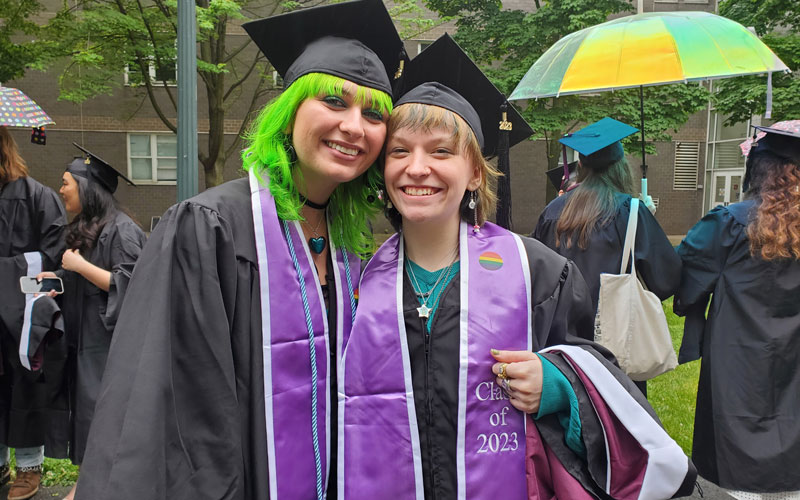
Drawn to New York City
Murray, who graduated from Fordham College at Lincoln Center as a double major in music and psychology, said that she will miss the activities she was involved in.
“I feel really lucky because all my people are staying in the city, and we all live pretty close together, so I’m excited to just continue living life,” she said. “But I am going to miss the clubs I was involved in a lot.”
She said she was drawn to Fordham because of its location in New York City.
“I grew up in Raleigh [North Carolina]. I lived in the same house my whole life … I knew I liked that city feel, but I wanted bigger, more to explore. I really decided New York was for me and then Fordham was just what I was drawn to,” Murray said.
Murray said that her favorite class was Race and Gender in Latin American Pop Music with Professor Angelina Tallaj-GarcÍa, assistant professor of music.
“She’s just so fabulous. I took that class over Zoom during Covid and it felt like an actual class [happening]in person,” she said. “Everybody was really talkative—we hung out in the chat, we all had a really nice community.””
Murray said she will be returning to New York City after traveling and visiting with family for a while, with a plan to work in music therapy.
Julia Rinaldi, who came to Fordham from Bergen County, New Jersey, also said she was drawn to Fordham for its location.
“I applied to Fordham Rose Hill,” she said. “And then I started touring the campuses and thought, ‘I didn’t even know Lincoln Center existed, and this is perfect for me.’ I wanted to be in Manhattan.”
Rinaldi, a psychology major, said she’s starting a doctoral program in clinical psychology at Felician College in New Jersey next.
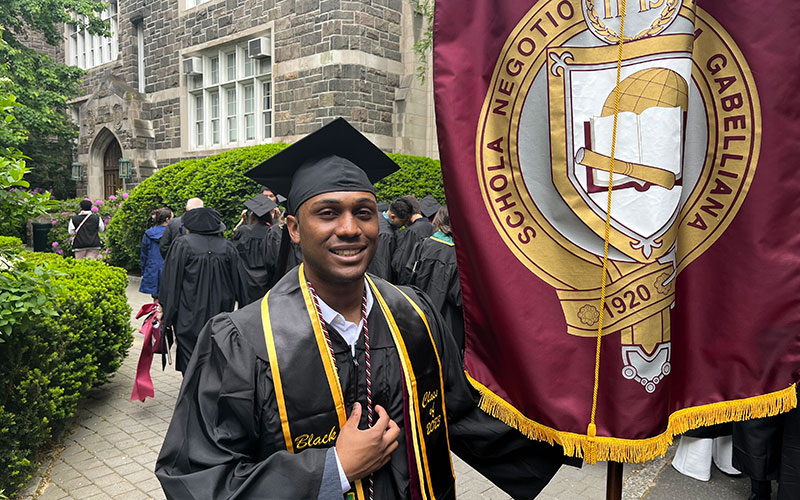
A Supportive Business School Community
Shaquille Kampta said that the Gabelli School of Business at Lincoln Center community helped him get through the last four years, despite pandemic-related challenges.
“I’m happy that we were able to persevere, especially with Gabelli, that camaraderie, and that group sense was very strong with our class, and as a group we were able to push through even though the pandemic was holding us back,” said Kampta, who majored in global business with a concentration in business economics and finance.
Kampta said that he will be working in wealth management in M&T Bank but plans to eventually go to law school.
Catherine Sperl entered Fordham as a transfer student and also said she appreciated the community she found at the Gabelli School.
“For Gabelli students, we’re all driven by the need to succeed and by academic markers that are visible and tangible,” Sperl said. “I think there’s something intrinsic to Fordham students, the spirit of Fordham is very collaborative and community-based.”
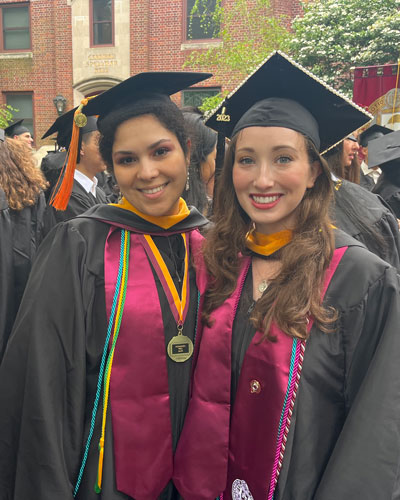
Sperl was a global business with a concentration in marketing and consumer insights along with her friend Melanie Sztulman, who had the same major. Sztulman said some of her favorite memories came from the University’s orientation program.
“I had a wonderful orientation experience, and at Lincoln Center, I worked as an orientation coordinator last year,” Sztulman said. “So it was a full circle moment for me to start off having such a positive experience in orientation and meeting so many wonderful people, and then helping new students.”
Sztulman is going off to Boston College Law School in the fall, while Sperl will be working in corporate communications at BlackRock.
Additional reporting by Patrick Verel
]]>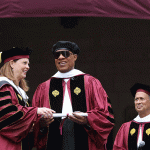
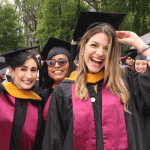
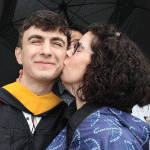
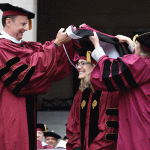
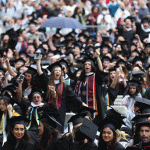
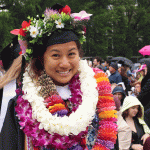
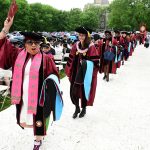
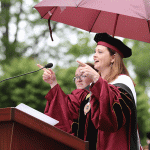
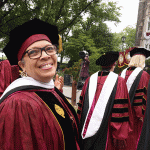
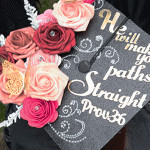
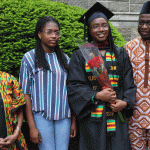
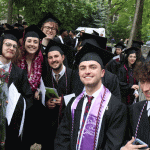

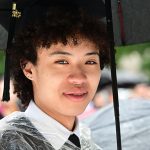
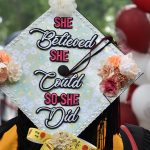

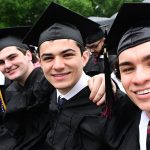
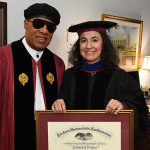
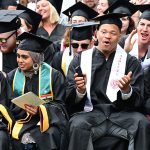
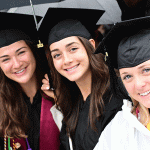 Music legend Stevie Wonder performed two songs from the Fordham Commencement stage, but not before offering the Class of 2023 some inspiration—and a challenge.
Music legend Stevie Wonder performed two songs from the Fordham Commencement stage, but not before offering the Class of 2023 some inspiration—and a challenge.
“The youth are going to make the difference. I believe in you. That’s why I sing, and that’s why I’m motivated,” he said at the May 20 ceremony, just after receiving an honorary doctorate from the University.
‘Stand Up and Be Counted’
“Fordham has given you the tools to achieve, to excel, and to do great things in this world. But that’s not gonna happen by sitting on your hands,” he said.
“You’ve got to be activists. You have to vote. You have to serve your communities and you must enlighten the unenlightened.”
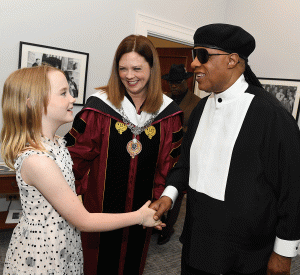
Wonder—a winner of 25 Grammys with 32 No. 1 singles— was honored for both his artistry and his leadership on social and humanitarian issues, such as making Martin Luther King Jr. Day a national holiday and expanding the availability of published works in accessible formats such as Braille, large print, and audiobooks.
He challenged the graduates assembled on Edwards Parade to use their education to respond to the realities of the world’s suffering.
“You really do have to be woke. Now, maybe some leaders in this nation don’t understand what being woke is. Let me tell you what it is. It’s being awake. And being awake means being aware,” he said, citing issues such as health care, education, and the recent chokehold death of homeless man Jordan Neely on the subway.
“So stand up and be counted as one against oppression, hatred, and let’s keep the truth alive,” he said.
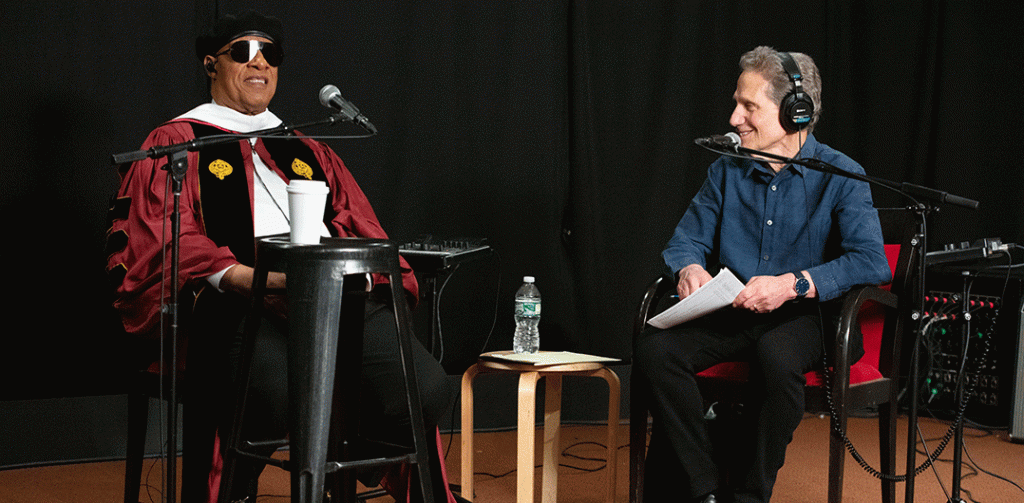
To the crowd’s delight, a keyboard was brought on stage, drawing loud cheers from graduates and families who were gathered under a light rain.
Wonder sang a song from his new project, Through the Eyes of Wonder, before segueing into “You Are the Sunshine of My Life,” drawing more cheers and applause.
‘What Makes You Special Is How You Will Use Your Gifts’
In her first Fordham Commencement address, Fordham President Tania Tetlow offered personal reflections about learning from her youngest sister, who graduated from high school despite having severe learning disabilities. She also talked about her parents and grandparents, who overcame the hardships of the Great Depression and World War II.
Like them, she said, the Class of 2023 has shown determination in the face of obstacles these past few years.
“There is so much about the pandemic we are eager to forget,” she said. “But when we look at those generations forged in the fires of suffering and crisis, we see the generations who’ve mattered most to history.”
And while she lauded graduates for their “blazing talent” and being “blessed by abundant gifts from God,” she cautioned that those gifts “do not make you better than anyone else.”
“What makes you special is not that good luck. It’s what you have done with your gifts. The endless hard work, in the library and the labs, the dance studios, and moot courtrooms. What makes you special is how you will use your gifts to matter to the world—as teachers, lawyers, social workers and health care workers, as business people who will build new forms of opportunity.”

Facing a fast-changing world with enormous courage, as graduates are, is quintessentially Jesuit, she said.
“Graduates, look around you—this is the family you have chosen. And Fordham is your forever home.”
The University conferred degrees upon 3,453 graduates today. Including those who graduated in August 2022 and February 2023, the University conferred about 5,453 academic degrees to the Class of 2023.
In addition to Wonder, Fordham conferred honorary doctorates on seven other notable figures: Norman Francis, a widely respected civil rights leader and former Xavier University president; Sharon Greenberger, president and CEO of the YMCA of Greater New York; Regina Pitaro, a Fordham trustee fellow, graduate of Fordham College at Rose Hill and a managing director of GAMCO Investors; Cardinal Michael Czerny, S.J., prefect of the Holy See’s Dicastery for Promoting Integral Human Development; Jeh Johnson, an attorney and widely quoted expert on national security issues who served as secretary of the U.S. Department of Homeland Security from 2013 to 2017; and Jennifer Jones Austin, chief executive officer of the Federation of Protestant Welfare Agencies in New York City.
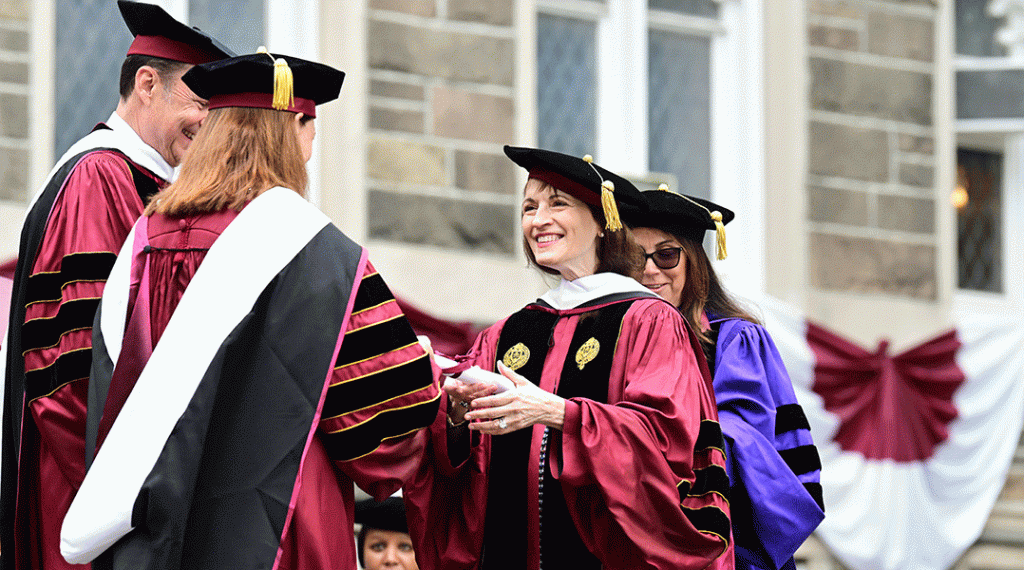
— Photos by Bruce Gilbert, Chris Taggart, Chris Gosier, Marisol Diaz, and Matthew Septimus
]]>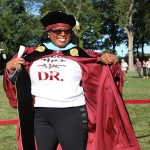
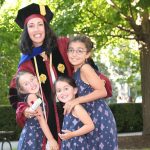
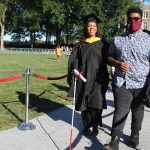
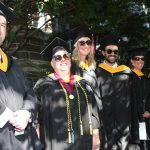
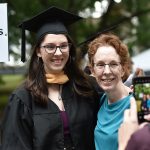
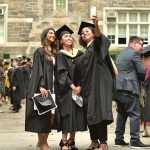
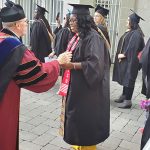
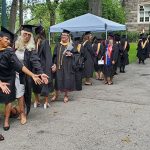
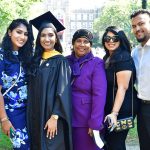
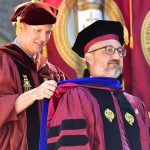
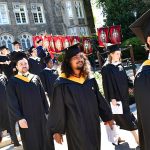
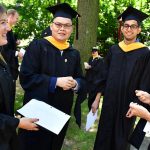
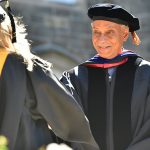
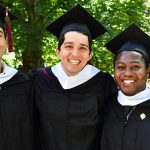
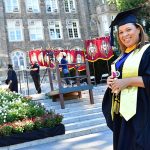
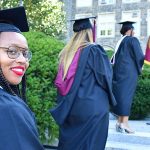
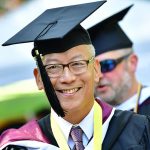
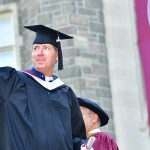 The calendar said mid-September, but the weather and the mood on the Rose Hill campus on Saturday and Sunday had a festive, summer-like feel, as hundreds of recent graduates celebrated the completion of their studies at in-person ceremonies on Edwards Parade.
The calendar said mid-September, but the weather and the mood on the Rose Hill campus on Saturday and Sunday had a festive, summer-like feel, as hundreds of recent graduates celebrated the completion of their studies at in-person ceremonies on Edwards Parade.
Members of the classes of 2020 and 2021 from four schools—the Graduate School of Social Service (GSS), the Graduate School of Arts and Sciences (GSAS), the Graduate School of Education (GSE), and the School of Professional and Continuing Studies (PCS), were feted in individual ceremonies for their perseverance during trying times.
Graduate School of Social Service
The Graduate School of Social Service’s ceremony attracted roughly 300 graduates on Saturday. Shaniqua Orr, a 2021 graduate, serenaded her classmates for their strength and shared that she too had gone through tough times, losing her parents in 2019 and 2020.
“Beginning March 2020, all of Fordham and the world experienced a traumatic life-changing event that affected us to our core,” she said. “Yet, in spite of all the many challenges we as a class experienced from start to finish, we are still here. We survived. We are indeed conquerors.”
Amauri Espinal, who was part of the Class of 2020, marveled at what a long journey it had been for him.
“I had the virtual ceremony last year, but it’s not the same as being here with your fellow classmates and colleagues, as well as the faculty.”
Espinal served two tours of duty in Iraq for the Army and has been working for the last three years for the New York City Department of Veteran Services. He said his GSS degree has helped him with his clinical and engagement skills with clients.
“Whether it’s dealing with a problem-solving approach or a clinical approach, it opened me up to getting more information from the client while doing self-reflection as well,” he said.
For graduates like Brittany Boudrea, also Class of 2020, it wasn’t so much a welcome back as it was an introduction to Rose Hill; she attended classes at Fordham’s Westchester campus. Boudrea works as an adolescent clinician for High Focus Centers in Norwalk, Connecticut.
“I never thought I’d get to walk across the stage here; it’s always been my dream for me to get a master’s at Fordham,” she said, adding that her degree helped her fulfill a calling.
“I’ve had past experiences that have helped guide me through life. I really want to advocate for people who can’t advocate for themselves,” she said.
Debra McPhee, Ph.D., dean of the Graduate School of Social Service, urged graduates to approach their work knowing that the COVID-19 pandemic has both revealed and exacerbated our society’s systemic inequities.
“If there is one gift of this period of tremendous loss and unrest, let it be a new understanding that accepting responsibility for the health, welfare, and equity of our fellow citizens has never been more critical,” she said.
Graduate School of Arts and Sciences
Sunday’s in-person ceremony was a first for Tyler Stovall, Ph.D., dean of the Graduate School of Arts and Sciences, who joined Fordham in June 2020 and had only presided over virtual ceremonies up until then.
Stovall said that the graduates would also be dealing with their own firsts and their own unprecedented challenges as they are “graduating into a world that is still in a very uncertain place.”
“It’s a world in which you are going to help make that difference in terms of how work is done, how research is done, how people work together to make a new and hopefully, better world,” he said.
“Your impact is going to be immediate. It’s going to be dramatic.”
Nicole Rizzo, who graduated in 2021 with a master’s in health administration, could relate to the immediacy. She credited the degree with a promotion to a senior administrative assistant at Northwell Health.
“I wanted to further my career, and this program was awesome because it’s only one year,” she said.
“I was able to get my degree, and now I’m off getting promotions; it’s great.”
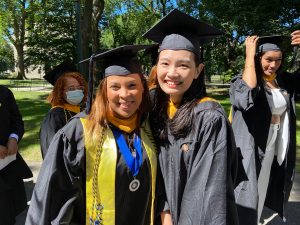
For Tzu-Ching Wu and Michelle Lamb, both 2020 graduates from the master’s in cybersecurity program, the ceremony was a chance to reconnect after they had started their program in person and then had to pivot to virtual learning due to the pandemic.
“It feels good to be here to see your academic goals come to fruition and see your peers once again,” Lamb said, adding that she was drawn to the program because she wanted a chance to make a difference.
“Fordham’s program had a great reputation. After speaking with Dr. Hayajneh (director of the M.S. in Cybersecurity program) I thought that the University would be a great fit for me,” she said.
“I thought it was a great investment in myself and it did give me the tools I needed to work in the cybersecurity field and do what I love and help people.”
Graduate School of Education
The Sunday ceremony for the Graduate School of Education was also the first for José Luis Alvarado, Ph.D., who started as dean in July.
Alvarado praised graduates for their ability to quickly adjust to remote learning and other challenges of the pandemic.
“Without a doubt, each of you was placed in a tough situation. Yet we stand here as a testament to your resilience and your tenacity,” he told them, adding that he looked forward to hearing about the impact they will have as educators.
Madison Cona, a 2020 graduate who earned a master’s in curriculum and teaching while teaching 7th and 8th-grade math at Great Hollow Middle School in Smithtown, New York, found that the pandemic collided with her studies in dramatic fashion, as she contracted COVID-19 during the spring semester, which she completed virtually.
“I was doing a project, it was my day to actually present to the class, and I was in the doctor’s office on Facetime with my class. It was a scary time, but everyone was really supportive and flexible,” she said.
“Fordham definitely gave me the hands-on skills that I needed to work in the classroom. Everything that I did at Fordham was applicable and I brought that in. Getting kids up and moving, classroom management, how to use manipulatives to teach students math—they were all real-world skills that I took with me.”
Joseph M. McShane, S.J., president of Fordham, spoke at each ceremony. At the GSE ceremony, he told graduates about his father’s cousin, who taught first grade for over 50 years. At her wake, one of her former students told him, “Your cousin gave me the gift of reading, and therefore gave me the world.”
He told the group of educators that they have that same calling. “You unlock the power of stories for your children and students, you nurture dreams and dreamers, you feel called to help the forgotten find their voices, to tell their stories,” he said.
“You have been heroes when no one was looking, and you are men and women after God’s own heart.”
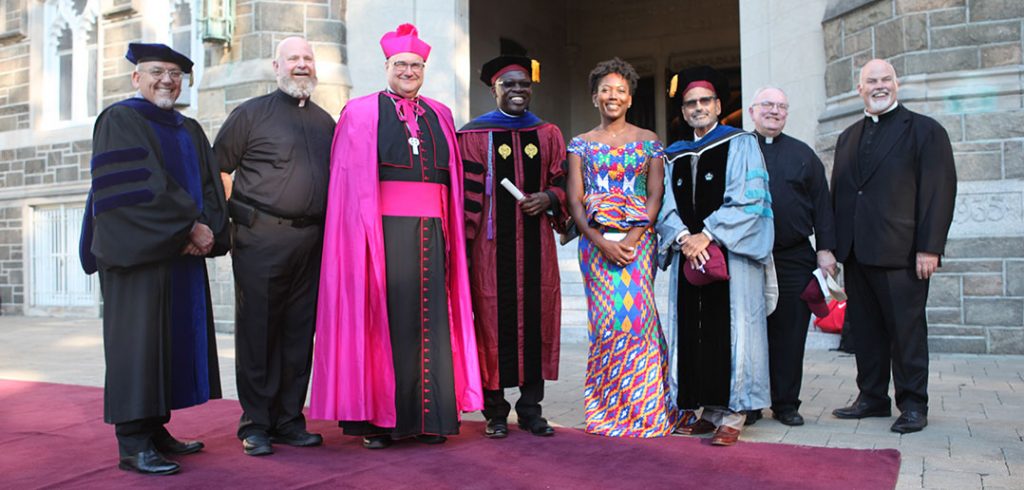
School of Professional and Continuing Studies
Gzim Hasandjekic, a Bronx native who graduated with a master’s of science in real estate from PCS in 2020, had already earned a bachelor’s degree in engineering from Fordham College at Rose Hill in 2018. The degrees have proven invaluable, he said, to his current job as development manager for Propco Holdings, a Bronx-based company that builds affordable housing units in the Bronx.
Hasandjekic’s parents immigrated to the U.S. from Albania, and he is the first in his family to earn a college degree. His father was a porter who cleaned bathrooms, and his mother was a stay-at-home mom.
“We struggled a lot, growing up. But I have a good job now, thank God, thanks to my parents’ sacrifices,” he said.
“I’m really doing it for them, more than anything, just so they can see me walk across the stage and receive my diploma. It’s a huge deal for my family.”
The class was praised by their student speaker, Margaret J. Burke, who graduated from PCS in 2020 with a Bachelor of Arts in Social Work and a year later earned an MSW at the Graduate School of Social Service. The eleventh of 12 children and only the second child to complete her college degree, she earned her G.E.D. at age 50 and knew then that she wanted to go to college.
“I literally cried on my first day. I just couldn’t believe I was here,” she said, choking up, as the audience applauded.
Social work was not what she originally planned to study, but when she arrived for that first class, the notion of approaching social work through the lens of trauma resonated deeply with her because of the personal struggles she’d faced.
“I was able to process grief and eventually heal, as it validated many of my feelings. It was cathartic and empowering, all at the same time,” she said.
“I guess I exemplify a PCS student: mature, older with lived experience, someone who came to Fordham to add to their education toward starting a new career. Fordham was able to help each of us see our experience, even our adverse experiences, from a universal perspective, helping us turn all those experiences into viable skills and insights we can use to help others on their journey, enabling all of us to soar to new heights.”
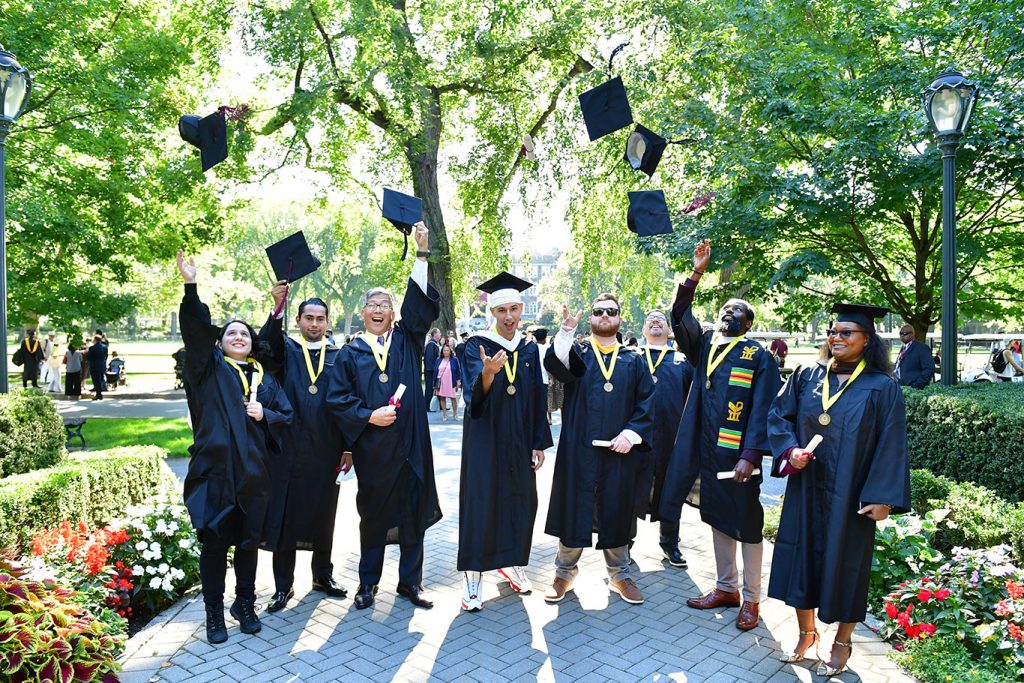
—Photos by Dana Maxson, Tom Stoelker, Chris Taggart, and Patrick Verel
—Reporting by Patrick Verel, Kelly Kultys, Adam Kaufman, Taylor Ha, and Gina Vergel
]]>